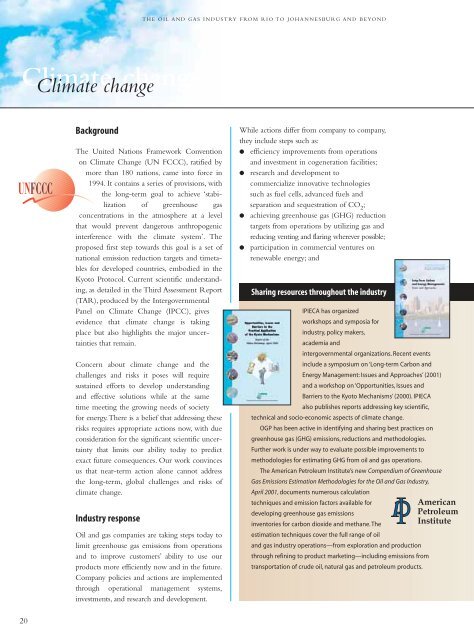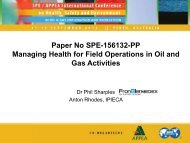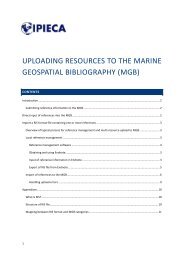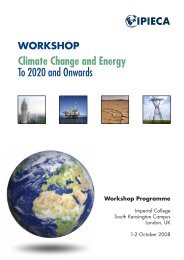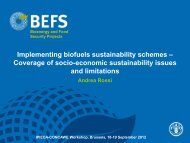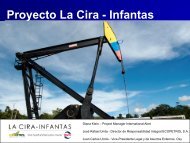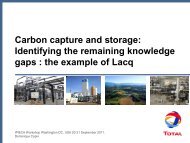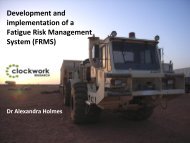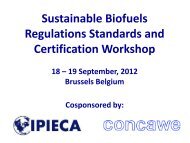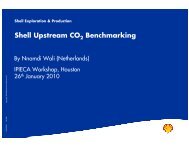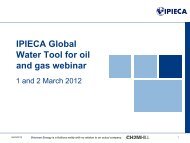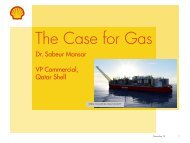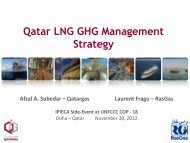WSSD Report FINAL! - OGP
WSSD Report FINAL! - OGP
WSSD Report FINAL! - OGP
Create successful ePaper yourself
Turn your PDF publications into a flip-book with our unique Google optimized e-Paper software.
THE OIL AND GAS INDUSTRY FROM RIO TO JOHANNESBURG AND BEYOND<br />
Climate change<br />
Climate change<br />
UNFCCC<br />
Background<br />
The United Nations Framework Convention<br />
on Climate Change (UN FCCC), ratified by<br />
more than 180 nations, came into force in<br />
1994. It contains a series of provisions, with<br />
the long-term goal to achieve ‘stabilization<br />
of greenhouse gas<br />
concentrations in the atmosphere at a level<br />
that would prevent dangerous anthropogenic<br />
interference with the climate system’. The<br />
proposed first step towards this goal is a set of<br />
national emission reduction targets and timetables<br />
for developed countries, embodied in the<br />
Kyoto Protocol. Current scientific understanding,<br />
as detailed in the Third Assessment <strong>Report</strong><br />
(TAR), produced by the Intergovernmental<br />
Panel on Climate Change (IPCC), gives<br />
evidence that climate change is taking<br />
place but also highlights the major uncertainties<br />
that remain.<br />
Concern about climate change and the<br />
challenges and risks it poses will require<br />
sustained efforts to develop understanding<br />
and effective solutions while at the same<br />
time meeting the growing needs of society<br />
for energy.There is a belief that addressing these<br />
risks requires appropriate actions now, with due<br />
consideration for the significant scientific uncertainty<br />
that limits our ability today to predict<br />
exact future consequences. Our work convinces<br />
us that near-term action alone cannot address<br />
the long-term, global challenges and risks of<br />
climate change.<br />
Industry response<br />
Oil and gas companies are taking steps today to<br />
limit greenhouse gas emissions from operations<br />
and to improve customers’ ability to use our<br />
products more efficiently now and in the future.<br />
Company policies and actions are implemented<br />
through operational management systems,<br />
investments, and research and development.<br />
While actions differ from company to company,<br />
they include steps such as:<br />
● efficiency improvements from operations<br />
and investment in cogeneration facilities;<br />
● research and development to<br />
commercialize innovative technologies<br />
such as fuel cells, advanced fuels and<br />
separation and sequestration of CO 2<br />
;<br />
● achieving greenhouse gas (GHG) reduction<br />
targets from operations by utilizing gas and<br />
reducing venting and flaring wherever possible;<br />
● participation in commercial ventures on<br />
renewable energy; and<br />
Sharing resources throughout the industry<br />
IPIECA has organized<br />
workshops and symposia for<br />
industry, policy makers,<br />
academia and<br />
intergovernmental organizations. Recent events<br />
include a symposium on ‘Long-term Carbon and<br />
Energy Management: Issues and Approaches’ (2001)<br />
and a workshop on ‘Opportunities, Issues and<br />
Barriers to the Kyoto Mechanisms’ (2000). IPIECA<br />
also publishes reports addressing key scientific,<br />
technical and socio-economic aspects of climate change.<br />
<strong>OGP</strong> has been active in identifying and sharing best practices on<br />
greenhouse gas (GHG) emissions, reductions and methodologies.<br />
Further work is under way to evaluate possible improvements to<br />
methodologies for estimating GHG from oil and gas operations.<br />
The American Petroleum Institute’s new Compendium of Greenhouse<br />
Gas Emissions Estimation Methodologies for the Oil and Gas Industry,<br />
April 2001,documents numerous calculation<br />
techniques and emission factors available for<br />
developing greenhouse gas emissions<br />
inventories for carbon dioxide and methane. The<br />
estimation techniques cover the full range of oil<br />
and gas industry operations—from exploration and production<br />
through refining to product marketing—including emissions from<br />
transportation of crude oil, natural gas and petroleum products.<br />
20


